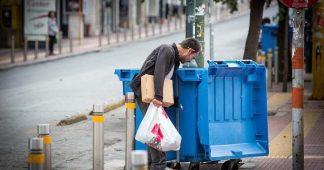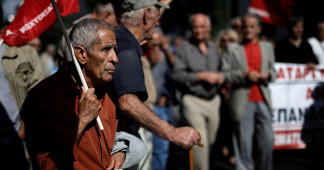Shocking report: Macroeconomic indicators improve but Greece’s society is suffering
February 1, 2018
Greek society in economic decline: Three out of four are long-time unemployed. 51% of the households depends on pensions. One in five households is afraid to lose its home. 70% of the young Greeks want to look for a work abroad. 16.3% say they cannot afford to cover an extraordinary expense of 500 euros.
These shocking data is the result of a public opinion poll conducted by GSEVEE, the Hellenic Confederation of Professionals, Craftsmen & Merchants. The poll was conducted in cooperation with Marc in a sample of 1006 households between 15 and 21 November 2017.
The survey data confirm that the despite the improvement of macroeconomic indicators, the ‘fruits of the austerity and reforms’ have not reached down to the average Greek.
Widening disparities between low and medium incomes lurking danger to the community development model according to the findings of the consecutive survey of the economic sentiment conducted by the GSEVEE.
Despite the signs of improving macroeconomic indicators, three important elements show that the improvement has not reached the average Greek on the street:
70% of young people want to look for work abroad,
51% of households rely on pensions despite the cuts that have already taken place
3 out of 4 unemployed are in long-term unemployment.
“Bomb at the foundation of social cohesion is that one in five households fear that they will lose their home,” GSEVEE chairman Giorgos Kavvathas said during the report presentation.
1 in 4 households is unable to meet its obligations.
Income – Economic situation of households
A marginal improvement is observed in terms of income mobility. More than 1 in 3 households (34.2%) say they live with annual family income on the bottom income scale (up to € 10,000).
- 62.4% of households reported a 2017 lower income than in 2016
- an increasing rate (35.6% vs. 22.2% in the 2016 survey) indicates a stabilization of their income status.
The overall decline in income is also reflected by the annual figures published in the ERGANI public system for 2017: the average annual gross salary amounted to EUR 1021.13 slightly lower than in 2016 at EUR 1057.21.
There is a clear trend of widening inequality in favor of upper income groups (in the category of over €30,000, there is an increase of 14.1% in the population). Especially vulnerable are households with one unemployed member of the household.
- Only 3.1% of the population manage to save money.
- In a recent study by the Bank of Greece (July 2017), it is noted that Greek households have lost 26% of their income and 37.5% of the value of their assets after the start of the crisis.
Poverty
14.6% of households indicate that their income is insufficient to meet their basic needs, a finding associated with the extreme poverty rate in the country (estimated at 40% of the median income, ELSTAT). According to official data from Eurostat Survey on Income and Living Conditions), the relative poverty threshold fell from €7,178 in 2010 to €4,500 in 2016, indicating a significant reduction of middle income. Taking the 2010 poverty line as a measure of comparison, about half of households would be considered poor today (48%).
The phenomenon of income poverty appears consistently high.
- With regards to the possibility of an extraordinary payment of 500 euros: 16.3% said they could not afford it, while 52.2% would cover this expenditure with great difficulty.
More than 6 out of 10 households (61.1%) are forced to make cuts to secure the necessary for their survival. It is noted that large (over 5) households and households with the unemployed face a more serious problem of meeting basic needs.
Expectations
Household expectations for 2018 remained negative:
- 63.6% in 2017 ( 73.5% in 2016) expect the worsening economic situation.
- 27.9% believe that it will remain stable
- 5,1% expects improvement of economic potential
The expectations are related to household projections on their ability to meet current and future liabilities, as well as low expectations related to the prospects for improving household finances.
Indicative is the fact that an increasing proportion of the population says they could meet the basic needs of the month with less than € 1,000 (34.3% in 2017 vs. 26.9% in 2014).
Pensions feed whole families
Pension remains the main source of income for more than half of households, despite individual cuts. The pension continues to remain as substitute for the welfare state and social protection.
- Without the pensions, the poverty ratio would be at 52.9% of the population.
Business Activities
Households declaring income from business activity as their main source of income remain at a very low 5.9% rate, suggesting that Greek domestic households are unable to develop viable and profitable business activities in the particular economic environment. It is obvious that for a large portion of households, starting up a business acts as a supplementary income support tool (in the form of an allowance).
Employment – Unemployment
29.9% of households, ie about 1 million households, have at least one unemployed person in the family. The long-term unemployment rate is 83.5% of the total unemployed. For all unemployed members of households, the unemployment benefit is limited to 7.3%.
Almost 3 out of 4 unemployed are in a state of long-term unemployment, which threatens to depreciate the productive fabric and the human capital of the country.
Economic marginalization concerns not only the unemployed population but also groups of workers.
- More than 1 in 5 households (21.5%) have a family member who works for less than the officially set minimum wage of €586 euros (490 euros net).
Economic migration
9.0% of households declare that they have at least one member who migrated abroad in order to find work. This is linked to a change in living conditions for more than 400,000 families..
According to the official data of the statistical authorities, there is an estimate of the migration of more than 710,000 Greek citizens from the beginning of the crisis (2010-2016).
The trend of continuing the phenomenon is worrying, as the migratory stream does not seem to be subdued.
40.1% of households would seriously consider migrating abroad if there were conditions for finding a job.
At younger ages 18-34 this figure is 72.3%.
It is characteristic that the richer and more educated groups of the society, consider it more likely to emigrate.
Financial obligations
– 19.6% of households have overdue debts to the tax office, while 55.6% of these debtors have been subject to some sort of regulation, indicating that most of the debtors are in a standing debt service and looking for solutions by extending them repayment times.
As the arrangements introduced for households in 2015 are no longer in force, the percentage of of citizens with overdue debts is expected to widen.
31.1% (from 27.3% in December 2016) of households with debt obligations has overdue debts to banks (approximately 450,000 households). The problem is most pronounced in the poorest and single-member households (with rates above 40%).
1 in 4 households think that they will not be able to meet their tax obligations next year
14.8% of households with their own property say they are unable to pay taxes on their property (ENFIA).
20.2% of the owners are twice liable for their property: along with the payment of ENFIA they must also pay the installments of the mortgage loan.
32.2% think it will not be able to meet its debt obligations next year.
Consumption – Quality of Life
Despite the relative improvement in some consumption indicators, the downward trend in domestic demand continues in a wide range of goods and services. Concerning consumption trends, a large share of the population recorded cuts in clothing-footwear costs (61.3%), going out (48.3%) in food products (40.2%) and household goods (40.1% ), associated with a change in consumer patterns in consumption of lower quality goods.
For 4th consecutive year after the so-called ‘reforms’ in health care since 2012 which were effectively cuts in state expenditure for this sector, the number of households that said they have increased their private spending on health and pharmaceutical care has increased. And so did the number of those who have increased spending on heating (special tax on heating oil was imposed in 2012.)
This finding highlights the need for immediate activation of the newly established primary health care program for the whole population as well as for the recovery of public confidence in public health structures. This widening trend in private spending to secure goods of a social nature like health care and heating is a deterrent to social well-being in general.
- 47.8% of households said they postponed or delayed receiving medical advice and treatment due to economic weakness.
Over 1 in 3 households have delayed to have a household electrical appliance repaired or have service in the car.
More than 1 out of 4 households are late to pay for the utilities and maintenance cost in home-buildings.
Based on ELSTAT statistics, households in the lowest income brackets have increased their household expenses by 17% in utilities and by 25% in transport since 2009.
All in all, citizens approve the so-called social dividend or social surplus to the vulnerable groups of the society like unemployed and low-pensioners.
citizens’ top priority is that taxes function “reciprocally” especially in the health care sector (73.2%), in education (45.8%) and in measures to boost employment and investment (40%).
PS for every average citizen living in Greece, this survey just confirms our daily Greek reality.
Published at http://www.keeptalkinggreece.com/2018/02/01/greece-society-austerity-suffering/











